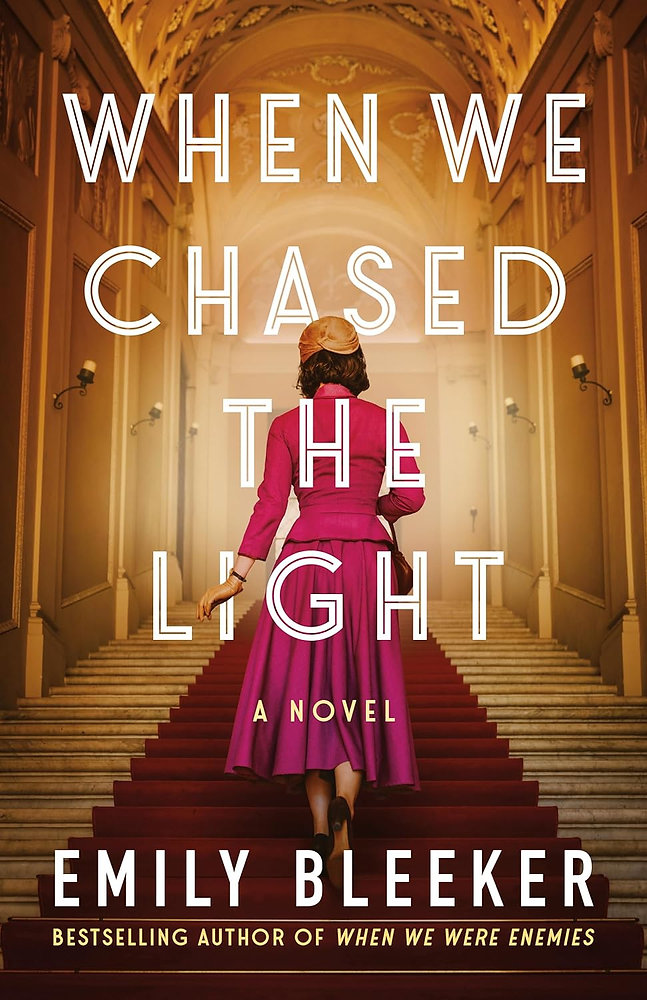
When We Chased the Light is the follow-up to When We Were Enemies, but it capably reads as a standalone novel. It’s 1943 and Vivian Snow is about to embark on her stratospheric rise to becoming Hollywood’s darling.
But her winsome public persona and glittering lifestyle hide a private life full of poor, rash decisions, driven by a fearful desperation to bury the past and the events that ended her first marriage…
The story opens and closes in 2014 with a press release and epilogue of the Beverly Hills’ auction of the now-deceased Snow’s personal effects.
The auction includes the hand-drawn postcards Father Antonio Trombello sent to her throughout her life. Bleeker presents the contents of these postcards at the beginning of each chapter, describing their illustration and the one or two sentences written by Trombello.
The postcards are a deft feature, gently intriguing, poignant, and weighted with the unspoken. Although Trombello features in the novel, it is through his concise little missives that the reader gains a sense of this beautifully measured, gracious, yet tormented man and his profound connection with Vivian.
Nonetheless, When We Chased the Light is Vivian’s story. Written in first-person and present tense, which gives a brilliant immediacy and keeps the pace lively, Vivian’s voice is instantly beguiling, self-deprecating, and driven.
For readers unfamiliar with the earlier book (I am one), backstory and context are effortlessly slipped into the first few chapters and, within a few pages, Bleeker introduces the first of many dark reveals and snappy twists.
Vivian is not always likable, prone to being a touch narcissistic yet unfailingly honest. Notwithstanding, she is a fascinating, captivating character whose trajectory is littered with absorbing, unpredictable turns. Her frustrating choices make for gripping reading and spring from well-meaning if misguided places. Given her confident, breezy tone, it’s easy to forget how much anguish she experiences throughout When We Chased the Light.
Indeed, Bleeker gives her a lot to contend with; just as she finds success in her career, which is hard-fought, her romantic life unravels spectacularly, and her family seems mired in simmering resentment and severe mental illness.
Aria, her sister, is a strange personality, slightly pathetic, yet the strength behind Vivian in more ways than one. Her violent verbal outburst just after halfway is sorely needed, as is her relationship with Margot.
Bleeker peppers the narrative with a liberal dose of dramatic irony, especially as Vivian heads into the 1950s and her second marriage, this time to director Glenn Carver. There is a sinister, controlling streak in Carver, fueled by alcohol and pills, which Bleeker signposts from the outset.
Early foreboding also swirls around Gracie, Vivian’s daughter. Bleeker adds dimension to their tense dynamic by shifting accountability for its toxicity in the later years to Gracie, who ultimately cuts a sad and somewhat nebulous figure.
Bleeker convincingly brings to life the golden age of Hollywood, for those readers familiar with the time, there are lovely, understated cameos and references to bygone legends, although Bleeker ensures the period never overshadows Vivian.
Nevertheless, it’s an incredibly entertaining backdrop and there is subtle exposure of the sordid, coercive side of the film industry, which also affects Vivian’s life in several ways.
But it’s Trombello who colors the novel; the few scenes between him and Vivian are loaded with emotion and sensual charge. The pace gently slows whenever he enters the narrative, and Bleeker’s prose becomes sepia-tinged with longing.
The novel is neatly structured, it could be leveled it’s a little long, and a couple of plot tangents are not required, but Bleeker moves the action along, sometimes by years, leaving few loose ends. A few lesser characters develop surprisingly and become quite central in places, Dr. Youngrin is one such, and the reader has an early hunch that screenwriter, Mick Mitcham, might prove a thorn in Vivian’s side.
When We Chased the Light is a sophisticated, sweeping, and sumptuous saga of a novel. Highly recommended.

